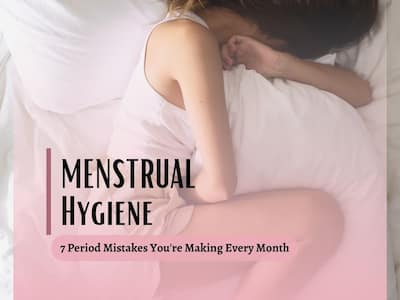
Did you know the importance of menstrual hygiene in women? Read on to find out!
Menstrual hygiene is of utmost importance for women as it directly impacts their physical health, emotional well-being, and overall quality of life. Proper menstrual hygiene practices, such as regular changing of sanitary products, washing the genital area, and maintaining cleanliness, help prevent infections like bacterial vaginosis, urinary tract infections, and vaginal yeast infections. Menstrual blood provides an ideal environment for bacterial growth, so maintaining hygiene is essential to minimize the risk of infections.
What Are Some of The Most Frequent Menstrual Hygiene Mistakes Made By Women?
If you are wondering about the unknown mistakes that you are committing while on periods, here is what Dr Preeti Rastogi, Director and HOD, Obstetrics and Gynaecology, Medanta, Gurugram wants you to know.
Wearing a Sanitary Pad or Tampon For Too Long
Using the same pad or tampon for a longer period of time might lead to bacterial development and unpleasant odours. It is critical to replace them every few hours. It’s important to change your sanitary pad frequently and especially tampons because they stay inside the vagina and can be easily forgotten. Menstrual cups must be emptied and cleaned every 4-6 hours.
Using Low-Quality or Outdated Menstruation Products
This might decrease cleanliness and raise the risk of infection. Women should opt for new and updated products and must verify expiration dates.
Improper Disposal of Old Menstruation Products
Improper disposal of used items, such as flushing them down the toilet, can lead to blocked pipes and contamination of the environment. It is important to dispose of the waste in specified containers.
Ignoring Personal Hygiene
Failure to practice good genital hygiene during menstruation increases the risk of infection. It is critical to wash with mild, unscented soap and water on a regular basis.
Using Scented Feminine Hygiene Products
Scented pads, and tampons, may alter the vagina’s natural pH balance, causing irritation or infection. It is recommended to avoid these and instead chooses unscented alternatives.
Why is Menstrual Hygiene So Crucial During Periods And What Are The Risk Factors Involved?
- Menstrual hygiene is essential during periods to avoid infections and maintain health.
- Infections such as yeast infections (candidiasis) and bacterial vaginosis can be increased by poor menstrual hygiene.
- Inadequate hygiene practices, such as utilizing dirty or expired sanitary goods, lead to infection development.
- Yeast infections are caused by a Candida fungal overgrowth and can cause itching, burning, abnormal discharge, and discomfort. Prolonged contact with moist or soiled sanitary goods can cause skin irritation, rashes, or dermatitis.
- Toxic Shock Syndrome (TSS) is an uncommon but dangerous disease caused by using high-absorbency tampons for an extended period of time.
- It is important to properly dispose of menstruation products in designated containers in order to prevent environmental contamination.
Dangers of Using Expired Sanitary Napkins
How frequently should sanitary pads or tampons be changed and what are the potential side effects of using expired menstruation products? What are the precautions for using reusable products?
To ensure adequate menstrual hygiene, sanitary pads or tampons should be replaced every four to eight hours throughout a period. Frequent replacement aids in the prevention of bacterial development, leaking, and unpleasant odours. Using expired menstruation products may result in negative side effects. Expired products may lose their ability to absorb menstrual flow, resulting in leakage and pain. Furthermore, expired goods might harbour germs, raising the risk of diseases like bacterial vaginosis or urinary tract infections. To guarantee maximum cleanliness and minimize any health hazards, always check the expiration dates and avoid using outdated menstruation products. For reusable menstrual items like cups or pads: Clean thoroughly before and after each use, sterilize between cycles, store in a clean container, and inspect regularly for damage.
How Does Your Lifestyle Habits Affect Your Menstruation?
Is there anything in one’s lifestyle or food that might affect menstruation hygiene and general menstrual health? A well-balanced diet rich in minerals, especially iron and vitamins, promotes overall menstrual health. Menstrual irregularity and blood flow might be affected by nutritional deficits.
READ RELATED: 6 Healthy High-Protein Meals That Trainers Are Obsessed With
Hydration
Staying hydrated supports healthy blood flow during menstruation and aids in the prevention of vaginal dryness.
Proper Blood Circulation
Regular exercise can help balance hormones, increase blood circulation, and alleviate period pain. Excessive or severe activity, on the other hand, might cause irregular periods or amenorrhea.
Stress Management
Excessive stress can interrupt menstrual cycles and aggravate symptoms. Stress-reduction measures, such as relaxation exercises or meditation, can improve menstruation health and a healthy sleep routine.
Tobacco and alcohol use can disturb hormone balance, interfere with menstrual regularity, and raise the risk of menstrual problems.
Tips To Keep Vaginal Health In Check During Periods
Take a look at these tips that can help you stay safe during your periods:
Maintain appropriate hygiene
During your period, it’s critical to replace your sanitary pads or tampons on a regular basis to avoid bacteria buildup and reduce the chance of infection. Avoid using harsh chemicals or douching while washing your vaginal region. use unscented soap and water.
Choose breathable clothing
Wear breathable cotton underwear and loose-fitting clothes to improve airflow and minimize moisture, which reduces the possibility of fungal or bacterial overgrowth.
Drink enough water
Drinking plenty of water flushes toxins from your body and keeps your vaginal tissues hydrated, which can aid with overall vaginal health.
Use unscented pads, tampons, or menstrual cups
Avoid using scented tampons or fragrant soaps, since they might disturb the normal pH balance of the vagina and create discomfort.
Total Wellness is now just a click away.
Follow us on
window.addEventListener(‘load’, (event) => {
// $(document).ready(function(){
$(‘#commentbtn’).on(“click”,function(){
(function(d, s, id) { var js, fjs = d.getElementsByTagName(s)[0]; if (d.getElementById(id)) return; js = d.createElement(s); js.id = id; js.src = “//connect.facebook.net/en_US/sdk.js#xfbml=1&version=v2.3”; fjs.parentNode.insertBefore(js, fjs);}(document, ‘script’, ‘facebook-jssdk’));
$(“.cmntbox”).toggle();
});
// });
});








